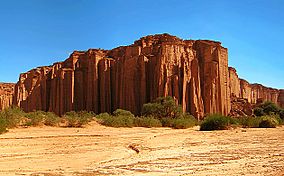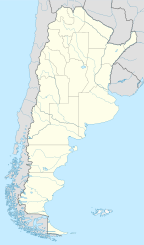Talampaya National Park facts for kids
Quick facts for kids Talampaya National Park |
|
|---|---|
|
IUCN Category II (National Park)
|
|

Wall at the channel system
|
|
| Location | La Rioja, Argentina |
| Nearest city | Villa Unión |
| Area | 2,150 km2 (830 sq mi) |
| Established | 1997 |
| Governing body | Administración de Parques Nacionales |
| Official name: Ischigualasto and Talampaya Natural Parks | |
| Type: | Natural |
| Criteria: | viii |
| Designated: | 2000 (24th session) |
| Reference #: | 966 |
| Region: | Latin America and the Caribbean |
Talampaya National Park (which means Parque Nacional Talampaya in Spanish) is a super cool national park in La Rioja Province, Argentina. It's a special place that protects amazing natural and historical treasures.
This area first became a protected reserve in 1975. Then, in 1997, it was officially named a national park. Just a few years later, in 2000, UNESCO declared it a World Heritage Site. This means it's considered important for everyone in the world to protect!
Contents
Where is Talampaya National Park?
The park is located in a dry, desert-like area called the High Monte ecoregion. It covers a huge space of about 2,150 square kilometers (830 square miles). The park sits high up, about 1,500 meters (4,900 feet) above sea level.
The main goal of the park is to protect important places. These include sites where scientists have found ancient fossils and signs of early human life. The park also has stunning landscapes and unique plants and animals.
The park is nestled between two mountain ranges: Cerro Los Colorados to the west and Sierra de Sañagasta to the east. The amazing shapes you see in the rocks were carved by wind and water over millions of years. The weather here can be extreme, with very hot days and cold nights. Sometimes, there are heavy rains in summer and strong winds in spring.
What Can You See at Talampaya?
Talampaya National Park is full of incredible sights and discoveries. Here are some of the main features:
Dinosaur Discoveries
The park has the dry bed of the Talampaya River. Millions of years ago, dinosaurs roamed and lived here! Scientists have found dinosaur fossils in this area. While not as many as in the nearby Ischigualasto park, these finds are still very exciting. They help us learn about the ancient creatures that once lived on Earth.
Giant Rock Walls
One of the most famous parts of the park is the Talampaya gorge. This is a deep canyon with towering rock walls. These walls, made of the Talampaya Formation rock, can reach up to 143 meters (469 feet) high! At one point, the canyon narrows to just 80 meters (260 feet) wide. Walking through it feels like being in a giant outdoor museum.
Ancient Art and History
The park also holds clues about ancient people who lived here long ago. You can see remains of their settlements. One amazing feature is the petroglyphs at the Puerta del Cañón. These are drawings carved into the rocks by indigenous peoples. They tell stories and show what life was like thousands of years ago.
Desert Plants
At the narrowest part of the canyon, there's a special botanical garden. This garden shows off the local plants that are able to survive in this dry desert environment. It's a great way to learn about the unique flora of the region.
Wildlife
Talampaya is home to many interesting animals. You might spot guanacos, which are related to llamas. There are also hares and maras, which are large rodents. Keep an eye out for foxes too! High above, you might even see a majestic condor soaring through the sky.
Images for kids
See also

- In Spanish: Parque nacional Talampaya para niños
 | Precious Adams |
 | Lauren Anderson |
 | Janet Collins |









